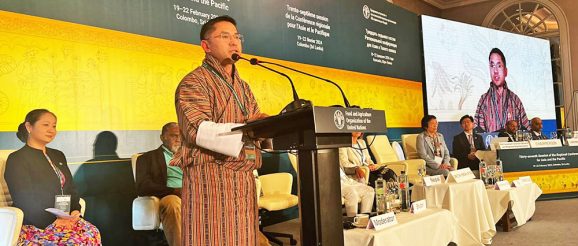Science and innovation for OCOP implementation in Bhutan

YK Poudel Addressing a plenary session at the on-going 37th Food and Agriculture Organizations (FAO) Regional Conference for Asia and the Pacific (APRC), Minister for Agriculture and Livestock Younten Phuntsho emphasised the need for science, innovation, and technology in agriculture. He talked about enhancing the lives and livelihoods of farming communities, aimed at ensuring the availability of nutritious food for people. Lyonpo along with two other ministers from the Asia-Pacific countries, pushed forward that science and innovative technologies can speed up efficient, resilient, and inclusive development of value chains of geographically specific special agricultural products (SAPs). “It helps in transformation of agri-food systems, enhancing smallholder incomes.” During the series of events, the minister was speaking at a special event on the FAO flagship initiative “One Country, One Priority Product (OCOP)”. “Through strategic investments and partnerships with stakeholders, we aim to realize the full potential of the OCOP initiative, benefiting thousands of households and fostering employment opportunities in the agri-food sector,” lyonpo said. “We are targeting to invest close to USD 15 million as part of initial intervention, while a larger area is aimed for upscaling, gradually,” Lyonpo added at the biennial conference.” He said that since joining the OCOP initiative in 2021 and identifying quinoa as its SAP, Bhutan has made “good progress in the development of its value chain including production, distribution, and consumption” and this has high potential “to address nutrition security challenges and reduce reliance on cereal imports, a significant expenditure for our country.” The OCOP initiative is a means to addressing the current and emerging challenges of hunger, food insecurity and malnutrition and contributing to the development of smallholders and family farms. The OCOP initiative is rooted in national and regional priority programmes and supported through the FAO Strategic Framework 2022-2031 aligned with the Sustainable Development Goals (SDGs). A focus of OCOP implementation in Asia and the Pacific region is building collaboration and strengthening partnerships with and among, members. The global, country-led OCOP initiative is helping develop sustainable value chains for SAPs which are crops with unique qualities linked to specific locales, farming practices and cultural heritages. SAPs have special tastes and high nutritional value but are yet to be grown and marketed to their full potential.
